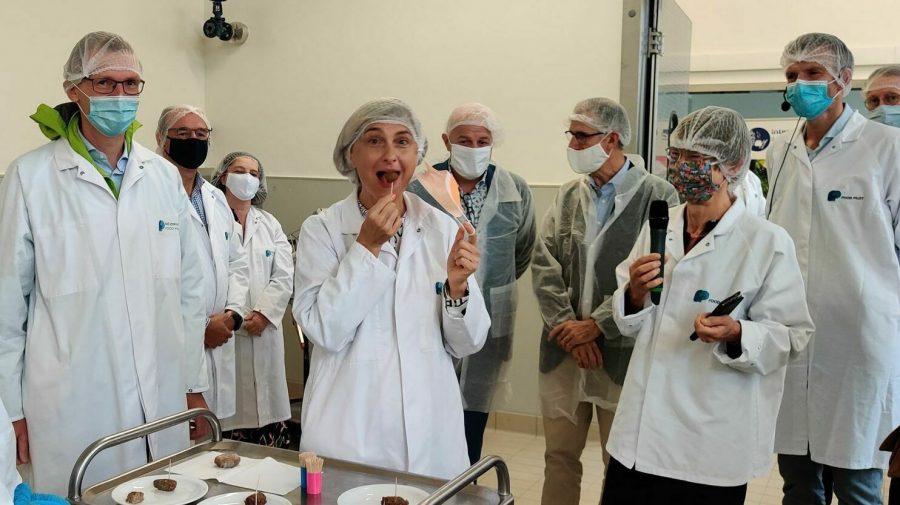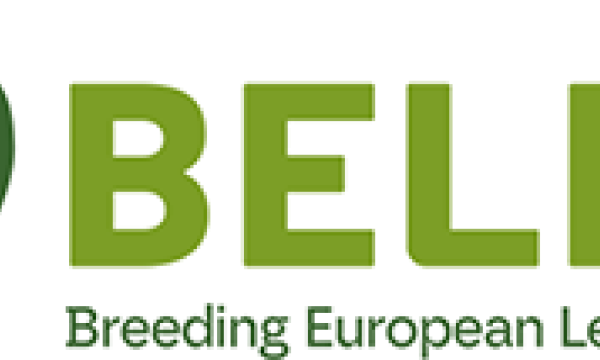Press release Alternative proteins for use in a wider range of food products?

In the Food Pilot in Melle, Flemish Minister of Economy, Innovation, Work, Social Economy and Agriculture Hilde Crevits inaugurated a new protein processing machine. The 'high moisture extruder' can process protein powder isolated from alternative proteins such as soy and sunflower seeds into protein with a fibrous structure. This structure is interesting for the development of a new generation of products for vegetarians and flexitarians.
The machine is the first - and most expensive - of the protein research line under construction. This expansion will cost the Food Pilot a total of more than half a million euros. The investment comes from ILVO and Flanders' FOOD, with support from the ERDF, VLAIO and the province of East Flanders.
Brochure 35 succes stories of the Food Pilot
The Food Pilot is a publicly funded pilot plant of ILVO and Flanders' FOOD, equipped with some 60 semi-industrial multifunctional devices and with a team of technologists, food experts and microbiologists, specialized laboratories and a taste panel. Food companies and researchers test new processes, products, raw materials and recipes hand in hand. The 35 success stories in the brand new Food Pilot brochure prove that this form of collaboration stimulates innovation in the food sector.
The first copy of this brochure was presented to the Minister on Wednesday 26 August, in the presence of ILVO top executive Joris Relaes, Fevia chairman Jan Vander Stichele, ILVO department head Lieve Herman and Flanders' FOOD director Inge Arents.
Protein diversification, easier said than done
Working with animal protein sources such as dairy, meat or eggs is based on a centuries-old tradition of knowledge. Vegetable proteins, microbial proteins or proteins from algae, seaweed or insects are much less familiar ingredients in European cuisine. There are still many knowledge gaps, especially about the underlying processes, compositions and behavior of these new concentrates, isolates (extracted proteins) or extrudates (proteins where a structure has already been inserted) in mixtures with other ingredients.
Geert Van Royen, coordinator of protein research at ILVO: "Today we do not know to what extent these new ingredients are oil-binding, water-binding, gelling, emulsifying or foaming. Companies need that kind of knowledge if they want to work with meat or dairy substitutes, for example. The question of the extent to which the nutritional protein value and the taste profile change after each possible processing is still largely open".
The expansion of the machine park with an equipment line for processing alternative proteins and a series of new protein research projects will change this.
Extruder in the middle of the protein line
Geert Van Royen, ILVO: "The high moisture extruder inaugurated by Minister Hilde Crevits is literally in the middle of the series of steps you have to perform with vegetable or other alternative protein to achieve a high-quality end product".
Extrusion in this case means stretching protein into long fibers by pressing it through a rotating screw under high temperature and pressure. The starting product is protein powder, which was first extracted from the plant, insect, algae or microbial biomass.
Thus, extraction takes place before extrusion: the protein present in the raw material is isolated from the other components. "This step is also provided for in the new protein research line. We install machines that can flake, defat, decant, centrifuge, filter and concentrate the alternative protein sources".
Extraction and/or extrusion are followed by the operations that fit the protein into the recipes to make burgers, drinks, meringue, desserts, cakes or other end products. These operations are already possible today in the Food Pilot.
The high moisture extruder inaugurated by Minister Hilde Crevits is literally in the middle of the series of steps you have to perform with vegetable or other alternative protein to achieve a high-quality end product
Research projects and a call to the companies
Food companies with an ambition to do something in the protein diversified market may already have product ideas that go beyond the vegetable burger or the pot of seasoned humus that is available on the market today.
Inge Arents, Flanders'FOOD: "It is very useful that they are able to confidentially communicate their technical questions about working with new proteins. Research projects can be worked out and requested around bottlenecks that are known to the researchers. But the questions may also be broader, if that this will help certain sectors to move forward".
It is very useful that they are able to confidentially communicate their technical questions about working with new proteins.
ILVO currently has 1 demo project and 7 research projects on new (non-animal) proteins in human nutrition. And there are still a few projects in the pipeline.
- Texprosoy: what is the impact of processing (extraction, drying and extrusion) on the behavior ('functionality') of locally grown soy proteins in food products?
- Valgorize: what can European cultivated seaweeds and micro-algae as a functional ingredient (taste, aroma, texture and/or color) mean for the European market?
- Profuture: how can proteins be extracted from micro-algae? What is their functionality, chemical and microbiological safety, nutritional quality and taste?
- Prometheus: what is the quality of microbial protein, what impact does processing (drying and extrusion) have on it, and what are possible applications of microbial protein in food?
- Meathybrid: can you produce cooking sausage, salami and chicken nuggets with less animal protein, by adding vegetable protein? And what is the effect of this on taste and nutritional value?
- Soy2Grow: how can soy be grown profitably in Flanders?
- Quilo: how can quinoa be grown profitably in Flanders?
Lieve Herman, ILVO: "As a research center we can now effectively support the protein diversification that Flanders is striving for in society. Together with food processors and farmers we are going to work with new crops, with new biomass, with new recipes and adapted processing processes".
As a research center we can now effectively support the protein diversification that Flanders is striving for in society
Minister sees opportunities for food innovation
On 26 August 2020, Minister Hilde Crevits assessed new leguminous crops at a scientific trial field in Merelbeke. Subsequently, she experimented with soy protein powder on the new semi-industrial extrusion machine in the Food Pilot in Melle, as well as tasting citizens with vegetable proteins.
Minister Hilde Crevits: "Our Flemish agri-food products are top quality. Today there is further proof that our agricultural and nutritional research is also at the top. All branches of agriculture are fully committed to innovation: new techniques, new crops and new products together form the way forward to a sustainable future with innovative companies in which we will be more resilient. By working on protein diversification and strengthening our own vegetable protein production, we are less dependent on foreign countries. Consumers demand both protein sources: a tasty piece of meat and a varied range of vegetable proteins.”
Consumers demand both protein sources: a tasty peace of meat and a varied range of vegetable proteins


